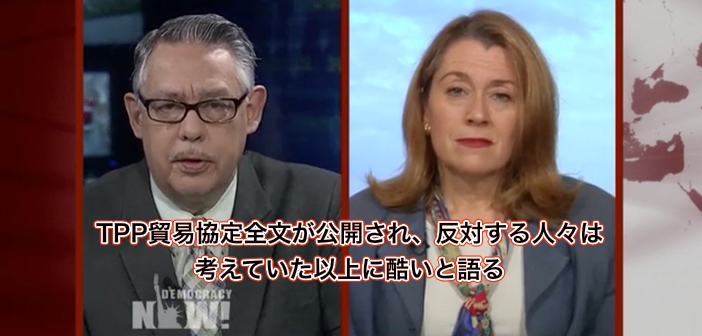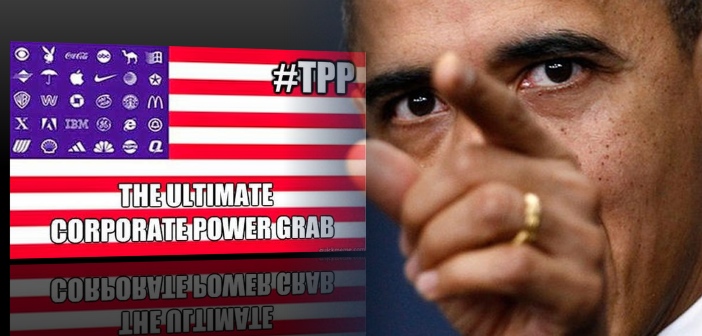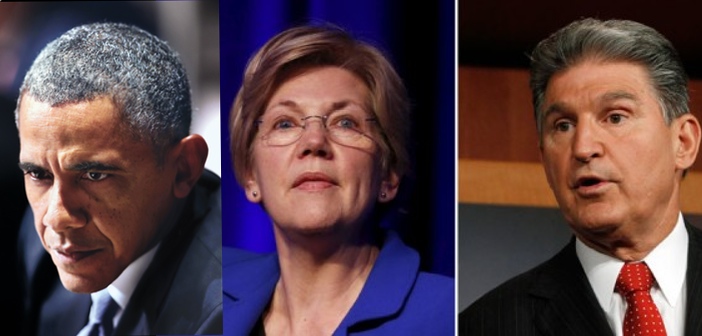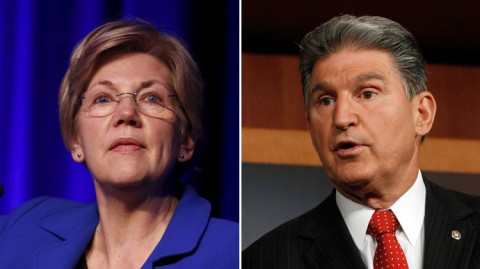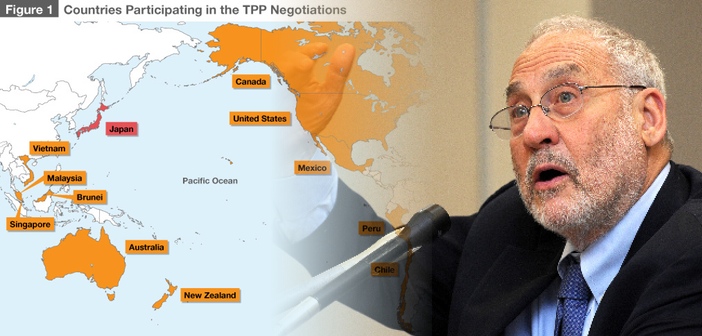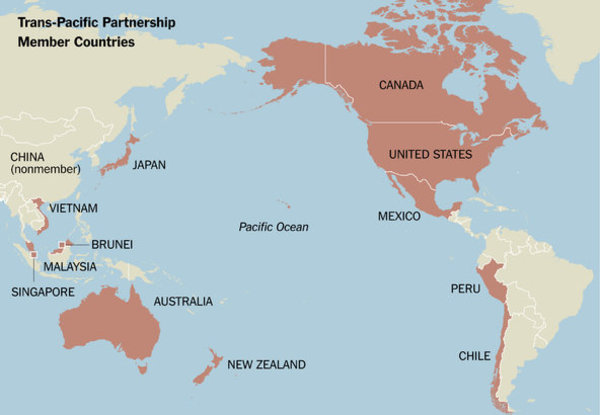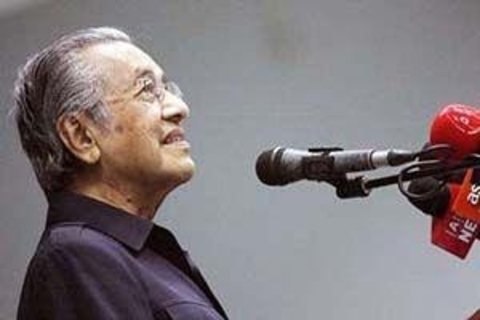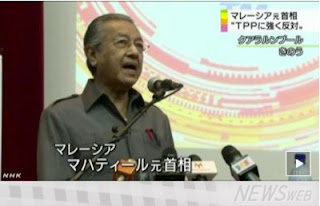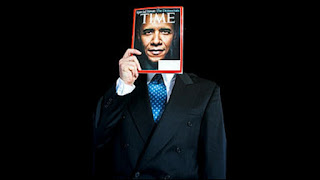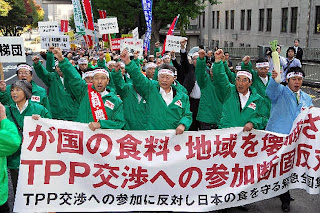image: 1
Full Text of TPP Trade Deal Revealed – and Critics Say It’s Even Worse Than They Thought
The TPP could not be agreed if correct information about it is reported. However, it is an agreement in favor of the One Percent who control the world. Since they control the media, the part against the people’s interests is never been reported. At any rate, the agreement has to be finally approved by the U.S. Congress and the Japan‘s Diet. However, I think that few Congress or Diet members have a strong will to refuse the TPP under existing conditions.
The TPP is a big step toward realizing the
New World Order. Regrettably, democracy that does not function properly has no
power to stop it. It is not until you become salves that you can understand
what the TPP is all about. It would be too late. We are facing an ultimate
choice between the two: we will establish a trade agreement which enslaves
humans or we will fall into the most painful hell together with the people who
have not prepared against financial collapse. No matter whenever it may be,
financial collapse will inevitably occur.
November
13, 2015
Masatoshi
Takeshita
Excerpt from a Japanese article: Overseas News Never Reported by Mass Media – November 13, 2015 –
Full
Text of TPP Trade Deal Revealed – and Critics Say It’s Even Worse Than They
Thought
Source:
The details are out on the the Trans-Pacific Partnership, and critics say the trade deal is worse than they feared. Activists
around the world have opposed the TPP, warning it will
benefit corporations at the expense of health, the environment, free speech and
labor rights.
JUAN GONZÁLEZ: One of the biggest and most
secretive trade deals in history has finally been revealed in full—and critics
say it’s even worse than they thought. On Thursday, the
complete text of the controversial Trans-Pacific Partnership was released
after years of closely guarded talks. The TPP was
agreed to last month between the United States and 11 other Pacific Rim
nations. The group represents 40 percent of the world’s economy. It will set common standards in areas including employment,
food safety, the Internet, corporate governance and intellectual property. It
also establishes new tribunals under which corporations can sue governments for
laws that affect their profits. The legal mechanism is called the
investor-state dispute settlement, or ISDS.
Activists around the world have opposed the TPP,
warning it will benefit corporations at the expense of
public health, the environment, free speech and labor rights.
AMY GOODMAN: With the fine print now disclosed, the TPP’s opponents
say their worst fears have been confirmed. …. it intends to ratify the TPP, starting a 90-day review period before President Obama
can seek final approval. The Senate has granted Obama the authority to
fast-track the TPP and present it to Congress for a
yes-or-no vote with no amendments allowed. Lawmakers will face heavy lobbying
from wealthy TPP backers, but grassroots opposition
could play a role, too.
For more, we’re joined by Lori Wallach, director of Public
Citizen’s Global Trade Watch, leading TPP critic.
LORI WALLACH: Well, it was worse than we
expected.
One, in the area of access to
affordable medicines, the TPP’s rules on patents, actually both for
developing countries but also for us, would roll back that initial reform and make medicine more expensive in pretty dramatic ways.
Number two, the investor-state
dispute resolution system is actually expanded out, in ways we should
discuss, so that more kinds of laws can be attacked, and many more companies will be able to attack U.S. laws.
And then the third thing that was kind of a shocker is
there is an expansion of the kind of attacks you can have on food safety, on imported food safety, which is really serious, because Malaysia and Vietnam, two of
the TPP countries, are amongst the major importers of
seafood and shrimp—a lot of their stuff gets stopped now for being unsafe—but
this agreement would give them new rights to
basically attack our stopping their stuff for food safety purposes and flood us with unsafe imports.
LORI WALLACH: Well, I think it’s very telling that yesterday the agribusiness industry was the only major industry that was extremely enthusiastic when the text came out. Well, they’re thinking of trying to jam our GMO foods into other countries. The TPP could mean poisonous food, that you can’t label from what country it comes from, on your kids’ plates. It could mean major public health issues.
JUAN GONZÁLEZ: Lori, I wanted to ask you—some groups came out against the agreement that you don’t usually associate with trade deals, like Doctors Without Borders and Human Rights Watch. Could you talk about their concerns?
LORI WALLACH: Yes. So, Doctors Without Borders, which basically, as everyone knows, is a major humanitarian group, is extremely concerned about what would happen with medicine prices. And this gets to the language I had mentioned, where I was shocked to see rollbacks of previous reforms that the Bush administration had made. So Big Pharma got a lot of goodies in this agreement. In a "free trade" agreement, we see new monopoly protections for Big Pharma. And so, Doctors Without Borders is basically pointing out that in a whole smorgasbord of policies, where Big Pharma was trying to use the TPP, the "good name of free trade," to put into place a bunch of new protections and privileges to raise medicine prices, they got their way. And the two biggest ones are—which is shocking rollbacks from the old U.S. trade standard, which was bad—is all the developing countries in TPP, including countries that are really poor, like Vietnam, ultimately have to have the same extreme patent standards, extreme exclusivities, that will just price people out of medicines. I mean, it will translate to people dying.
AMY GOODMAN: That’s what Doctors Without Borders said. This is U.S. Trade Representative Michael Froman on the impact of the TPP on research and access to life-saving drugs.
MICHAEL FROMAN: On biologics, as you know, this is one of the most challenging issues in the negotiation. We have worked cooperatively with all of our TPP parties—partners to secure a strong and balanced outcome, that both incentivizes the development of these new life-saving drugs while ensuring access to these pioneering medicines and their availability. And this is the first trade agreement in history to ensure a minimum period of protection for biologics.
AMY GOODMAN: That’s the U.S. trade representative, Michael Froman. Lori Wallach, your comment on both clips?
LORI WALLACH: ….. I mean, the bottom line is, most of the countries involved have no exclusivity for those kinds of cutting-edge drugs, which are a lot of the cutting-edge cancer cures—biologics—and now they will have five years, at a minimum. The industry says they got eight years. There will be enormous pressure to have more monopolies. And just think about the theory of this: a "free trade" agreement that stops competition. It stops the competition of generics that bring down prices. That is actually what’s in the text, whatever the U.S. officials are saying. We can read it now.
JUAN GONZÁLEZ: Well, Lori, where do we go from here? Obviously, there will soon be a 90-day period for Congress to vote on the fast-tracking of this bill.
LORI WALLACH:….. So, ostensibly, by the first week of February, the TPP could be signed.
….. the most important thing for all of us to think about,
is it only becomes reality if Congress approves it. Now, we are behind the
eight ball …. However, by five votes only did fast
track pass. That means ….. if we have five
members in the House of Representatives who say, "Oh, no, that is not what
I signed up for," that’s the end of TPP. …
we’re going to have to talk to our members of Congress, and we need to start now. … Grab a couple of your friends
and your family, go tell your members of Congress you need that commitment. We
can stop this.
